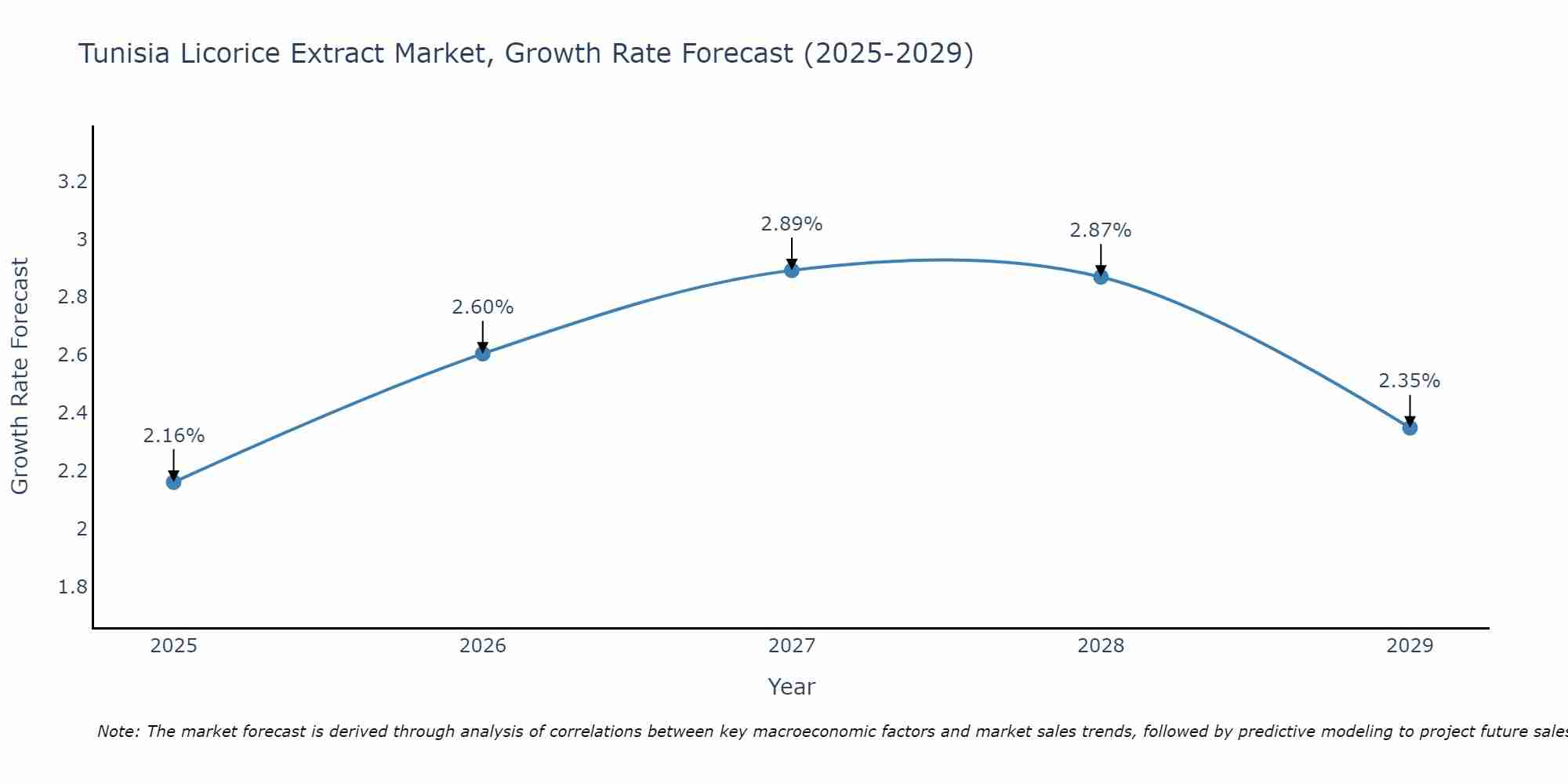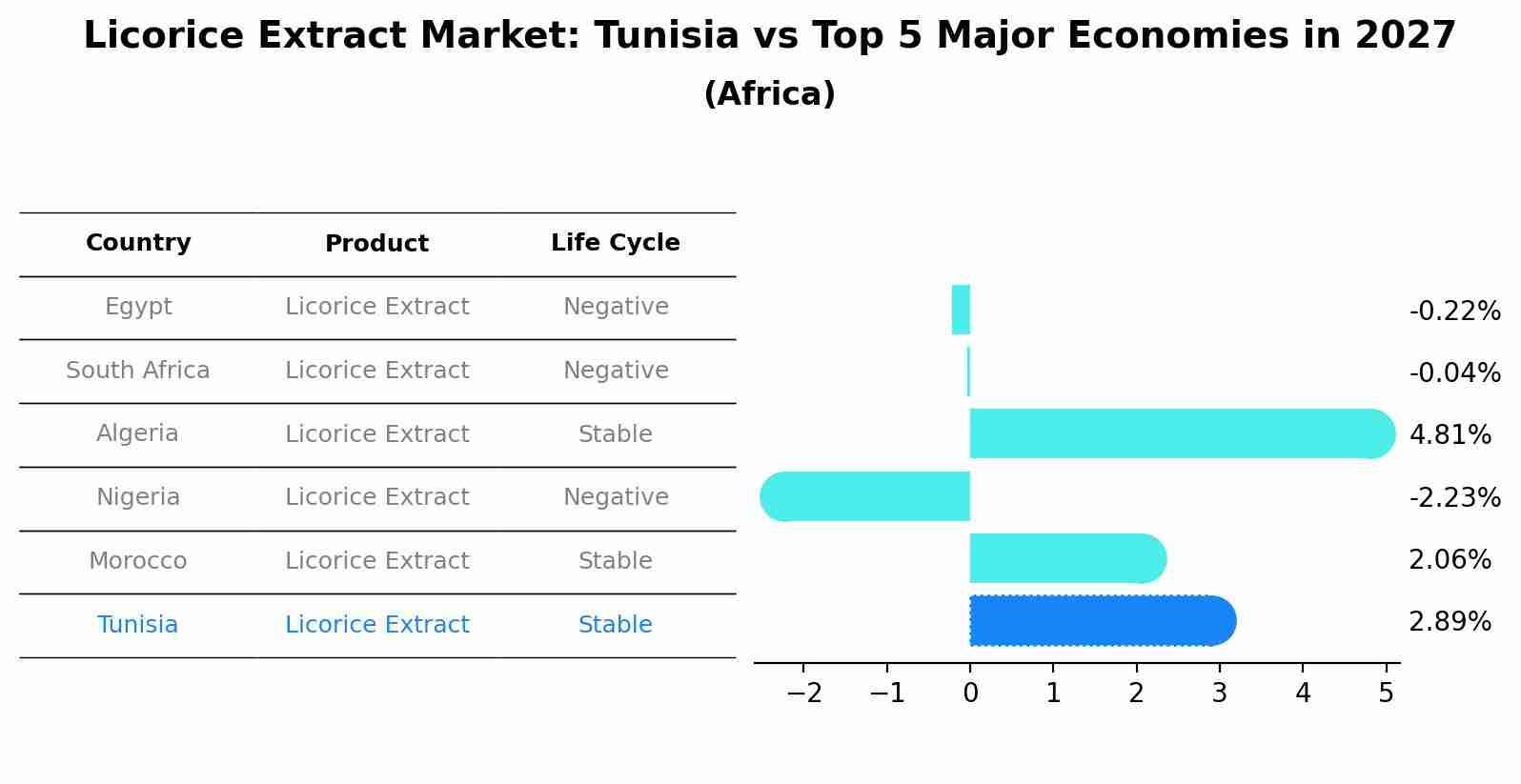Tunisia Licorice Extract Market (2025-2031) Outlook | Revenue, Analysis, Growth, Share, Industry, Forecast, Trends, Companies, Size & Value
| Product Code: ETC389034 | Publication Date: Aug 2022 | Updated Date: Apr 2025 | Product Type: Market Research Report | |
| Publisher: 6Wresearch | Author: Shubham Padhi | No. of Pages: 75 | No. of Figures: 35 | No. of Tables: 20 |
Tunisia Licorice Extract Market Size Growth Rate
The Tunisia Licorice Extract Market is projected to witness mixed growth rate patterns during 2025 to 2029. The growth rate begins at 2.16% in 2025, climbs to a high of 2.89% in 2027, and moderates to 2.35% by 2029.

Licorice Extract Market: Tunisia vs Top 5 Major Economies in 2027 (Africa)
Tunisia's Licorice Extract market is anticipated to experience a stable growth rate of 2.89% by 2027, reflecting trends observed in the largest economy Egypt, followed by South Africa, Algeria, Nigeria and Morocco.

Tunisia Licorice Extract Market Overview
Tunisia`s licorice extract market is expanding with natural sweeteners and herbal ingredients used in food, beverage, and pharmaceutical formulations, focusing on flavor enhancement, health benefits, and consumer preference for plant-based products. Market dynamics include sustainable sourcing practices, extraction technologies preserving bioactive compounds, and regulatory approvals for licorice extract applications. The market serves food manufacturers, beverage companies, and dietary supplement producers seeking versatile and natural ingredients to meet evolving market trends and consumer demands.
Drivers of the market
The Tunisia licorice extract market is influenced by natural ingredients, herbal supplements, and demand for licorice root extracts in pharmaceuticals, confectionery, and skincare products. Licorice extract offers anti-inflammatory, antioxidant, and flavor-enhancing properties, making it valuable in traditional medicine and modern applications. The market benefits from Tunisia`s licorice cultivation, sustainable harvesting practices, and global demand for botanical extracts. Moreover, regulatory approvals for herbal remedies, consumer preference for natural health products, and research advancements in phytochemicals are driving market expansion and product innovation in Tunisia.
Challenges of the market
The licorice extract market in Tunisia confronts challenges associated with agricultural practices and market competitiveness. Fluctuating licorice root yields due to climatic conditions impact extract production and supply chain stability. Moreover, price volatility in raw material costs and competition from global suppliers influence market pricing and profitability for local producers. Regulatory compliance for herbal product quality standards and export regulations further adds complexity to market operations and product certification processes, affecting industry competitiveness and growth.
Government Policy of the market
Government supports quality control and sustainable sourcing practices in licorice extract production, promoting medicinal and confectionery applications while ensuring environmental stewardship.
Key Highlights of the Report:
- Tunisia Licorice Extract Market Outlook
- Market Size of Tunisia Licorice Extract Market, 2024
- Forecast of Tunisia Licorice Extract Market, 2031
- Historical Data and Forecast of Tunisia Licorice Extract Revenues & Volume for the Period 2021-2031
- Tunisia Licorice Extract Market Trend Evolution
- Tunisia Licorice Extract Market Drivers and Challenges
- Tunisia Licorice Extract Price Trends
- Tunisia Licorice Extract Porter's Five Forces
- Tunisia Licorice Extract Industry Life Cycle
- Historical Data and Forecast of Tunisia Licorice Extract Market Revenues & Volume By Product Type for the Period 2021-2031
- Historical Data and Forecast of Tunisia Licorice Extract Market Revenues & Volume By Food Grade for the Period 2021-2031
- Historical Data and Forecast of Tunisia Licorice Extract Market Revenues & Volume By Feed Grade for the Period 2021-2031
- Historical Data and Forecast of Tunisia Licorice Extract Market Revenues & Volume By Pharmaceutical Grade for the Period 2021-2031
- Historical Data and Forecast of Tunisia Licorice Extract Market Revenues & Volume By Form for the Period 2021-2031
- Historical Data and Forecast of Tunisia Licorice Extract Market Revenues & Volume By Powder for the Period 2021-2031
- Historical Data and Forecast of Tunisia Licorice Extract Market Revenues & Volume By Liquid for the Period 2021-2031
- Historical Data and Forecast of Tunisia Licorice Extract Market Revenues & Volume By Block for the Period 2021-2031
- Historical Data and Forecast of Tunisia Licorice Extract Market Revenues & Volume By Application for the Period 2021-2031
- Historical Data and Forecast of Tunisia Licorice Extract Market Revenues & Volume By Food & Beverages for the Period 2021-2031
- Historical Data and Forecast of Tunisia Licorice Extract Market Revenues & Volume By Pharmaceutical for the Period 2021-2031
- Historical Data and Forecast of Tunisia Licorice Extract Market Revenues & Volume By Tobacco for the Period 2021-2031
- Historical Data and Forecast of Tunisia Licorice Extract Market Revenues & Volume By Others for the Period 2021-2031
- Tunisia Licorice Extract Import Export Trade Statistics
- Market Opportunity Assessment By Product Type
- Market Opportunity Assessment By Form
- Market Opportunity Assessment By Application
- Tunisia Licorice Extract Top Companies Market Share
- Tunisia Licorice Extract Competitive Benchmarking By Technical and Operational Parameters
- Tunisia Licorice Extract Company Profiles
- Tunisia Licorice Extract Key Strategic Recommendations
Frequently Asked Questions About the Market Study (FAQs):
- Single User License$ 1,995
- Department License$ 2,400
- Site License$ 3,120
- Global License$ 3,795
Search
Related Reports
- Australia IT Asset Disposal Market (2025-2031) | Strategy, Consumer Insights, Analysis, Investment Trends, Opportunities, Growth, Size, Share, Industry, Revenue, Segments, Value, Segmentation, Supply, Forecast, Restraints, Outlook, Competition, Drivers, Trends, Demand, Pricing Analysis, Competitive, Strategic Insights, Companies, Challenges
- UAE Building Thermal Insulation Market Outlook (2025-2031) | Revenue, Companies, Share, Trends, Growth, Size, Forecast, Industry, Analysis & Value
- Portugal Electronic Document Management Market (2025-2031) | Strategy, Consumer Insights, Analysis, Investment Trends, Opportunities, Growth, Size, Share, Industry, Revenue, Segments, Value, Segmentation, Supply, Forecast, Restraints, Outlook, Competition, Drivers, Trends, Demand, Pricing Analysis, Competitive, Strategic Insights, Companies, Challenges
- France Electronic Document Management Market (2025-2031) | Strategy, Consumer Insights, Analysis, Investment Trends, Opportunities, Growth, Size, Share, Industry, Revenue, Segments, Value, Segmentation, Supply, Forecast, Restraints, Outlook, Competition, Drivers, Trends, Demand, Pricing Analysis, Competitive, Strategic Insights, Companies, Challenges
- Portugal Occupational Health & Safety Services Market (2025-2031) | Strategy, Consumer Insights, Analysis, Investment Trends, Opportunities, Growth, Size, Share, Industry, Revenue, Segments, Value, Segmentation, Supply, Forecast, Restraints, Outlook, Competition, Drivers, Trends, Demand, Pricing Analysis, Competitive, Strategic Insights, Companies, Challenges
- Netherlands Occupational Health and Safety Services Market (2025-2031) | Strategy, Consumer Insights, Analysis, Investment Trends, Opportunities, Growth, Size, Share, Industry, Revenue, Segments, Value, Segmentation, Supply, Forecast, Restraints, Outlook, Competition, Drivers, Trends, Demand, Pricing Analysis, Competitive, Strategic Insights, Companies, Challenges
- Belgium and Luxembourg Facility Management Market (2025-2031) | Strategy, Consumer Insights, Analysis, Investment Trends, Opportunities, Growth, Size, Share, Industry, Revenue, Segments, Value, Segmentation, Supply, Forecast, Restraints, Outlook, Competition, Drivers, Trends, Demand, Pricing Analysis, Competitive, Strategic Insights, Companies, Challenges
- Russia Women Intimate Apparel Market (2025-2031) | Strategy, Consumer Insights, Analysis, Investment Trends, Opportunities, Growth, Size, Share, Industry, Revenue, Segments, Value, Segmentation, Supply, Forecast, Restraints, Outlook, Competition, Drivers, Trends, Demand, Pricing Analysis, Competitive, Strategic Insights, Companies, Challenges
- Africa Chocolate Market (2025-2031) | Size, Share, Trends, Growth, Revenue, Analysis, Forecast, industry & Outlook
- Global Hydroxychloroquine And Chloroquine Market (2025-2031) | Industry, Trends, Size, Outlook, Growth, Value, Companies, Revenue, Analysis, Share, Forecast
Industry Events and Analyst Meet
Our Clients
Whitepaper
- Middle East & Africa Commercial Security Market Click here to view more.
- Middle East & Africa Fire Safety Systems & Equipment Market Click here to view more.
- GCC Drone Market Click here to view more.
- Middle East Lighting Fixture Market Click here to view more.
- GCC Physical & Perimeter Security Market Click here to view more.
6WResearch In News
- Doha a strategic location for EV manufacturing hub: IPA Qatar
- Demand for luxury TVs surging in the GCC, says Samsung
- Empowering Growth: The Thriving Journey of Bangladesh’s Cable Industry
- Demand for luxury TVs surging in the GCC, says Samsung
- Video call with a traditional healer? Once unthinkable, it’s now common in South Africa
- Intelligent Buildings To Smooth GCC’s Path To Net Zero













